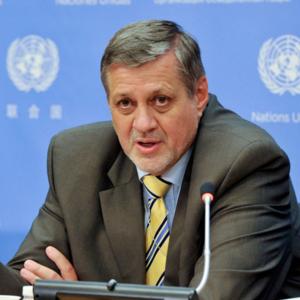Baghdad, 04 February 2017 – Special Representative of the United Nations Secretary-General (SRSG) for Iraq Mr. Ján Kubiš briefed the UN Security Council on the situation in Iraq on 02 February 2017, foreseeing the inevitable demise of Daesh’s so-called caliphate but warning that a tough fight lies ahead as Iraqi security forces advance towards western Mosul and urging robust international support for post-conflict recovery.
“This steady progress should not conceal that fighting has been and will be a massive challenge, in particular inside the old city in western Mosul,” the Special Representative said at a session of the Security Council in New York. “Yet, in the rather short foreseeable future, the liberation operations in Iraq are coming to an end - the days of the so-called ISIL caliphate in Iraq are counted.”
He praised the bravery of the Iraqi Security Forces, including the Counter Terrorism Service, Army, Police, Popular Mobilization Forces, Peshmerga, and local volunteers. “I take this opportunity to honour the martyrs who have sacrificed their lives in the fight against the international terrorists of ISIL, for a free and united Iraq and in defence of human values shared by the world, as strong allies of the US and a steady part of the international anti-ISIL coalition.”
Mr. Kubiš urged the international community, including Iraq’s regional partners, to assist the country after the military battle against the terrorist group is won.
“In the post-Daesh period, Iraq will need continuous, substantial and sustainable support and assistance from the international community, including its regional partners. Any abrupt scaling-down of engagement or support would mean repeating mistakes of the past - mistakes that have had grave consequences for stability and security, well beyond the borders of Iraq.”
The SRSG warned that the humanitarian crisis is expected to continue for months, if not years. “Providing support to help people restart their lives must be seen as one of the highest collective priorities of the international community.”
Mr. Kubiš noted that in December, humanitarian partners presented an advance summary of the 2017 Humanitarian Response Plan under which at least USD 985 million this year are required to reach the 5.8 million most vulnerable Iraqis. Of this amount, USD 331 million is being sought specifically for the Mosul response.
The Special Representative noted that Iraq had adopted the humanitarian concept of operations in the fight against Daesh, prioritizing the protection of civilians. He called on the authorities to ensure security and act to restore rule of law in all liberated areas with a particular attention to minorities, stressing that these actions would impact future reconciliation efforts.
“The protection of civilians, the avoidance of steps that could incite sectarian tensions, and the prevention of revenge attacks in Mosul, but also in other liberated areas of the country, are of vital importance for winning the hearts and minds of the population. They constitute first steps in the process of national and community-based reconciliation, in building a new and truly unified and united Iraq in which all its people will feel as equal citizens, under fair treatment and the protection of the State,” Mr. Kubiš said.
Turning to the political and reconciliation process, the SRSG said the National Alliance Initiative on the way forward in post-Daesh Iraq is a good starting point and encouraged all Iraqi partners to prepare their vision papers on national reconciliation and engage constructively in this Iraqi-owned and led, and UN-facilitated, process of national settlement and reconciliation.
Mr. Kubiš said UNAMI is currently working with various groups, including the Sunni and Turkmen components, Kurdistan Region of Iraq, civil society, minority communities, tribal leaders, and youth and women groups with the aim of soliciting their views and vision on how to build a post-Daesh united Iraq, based on the principles of equality and citizenship.
He emphasized that “for national reconciliation to succeed, it must be supported by grassroots initiatives,” noting UNAMI’s launching of the “Iraq: Youth and Coexistence” series of meetings across the country to involve the youth in the reconciliation process.
The SRSG called on the political blocs in the Iraqi Parliament, civil society, and other stakeholders to cooperate with the Prime Minister to accelerate his Reform Agenda, noting that the Iraqi people continue to call for fair and equal treatment, transparent governance, and better service delivery. He urged Baghdad and Erbil to extend their cooperation in the fight against Daesh in Mosul to also cover outstanding issues in the political, economic, and administrative fields.
BTSC


